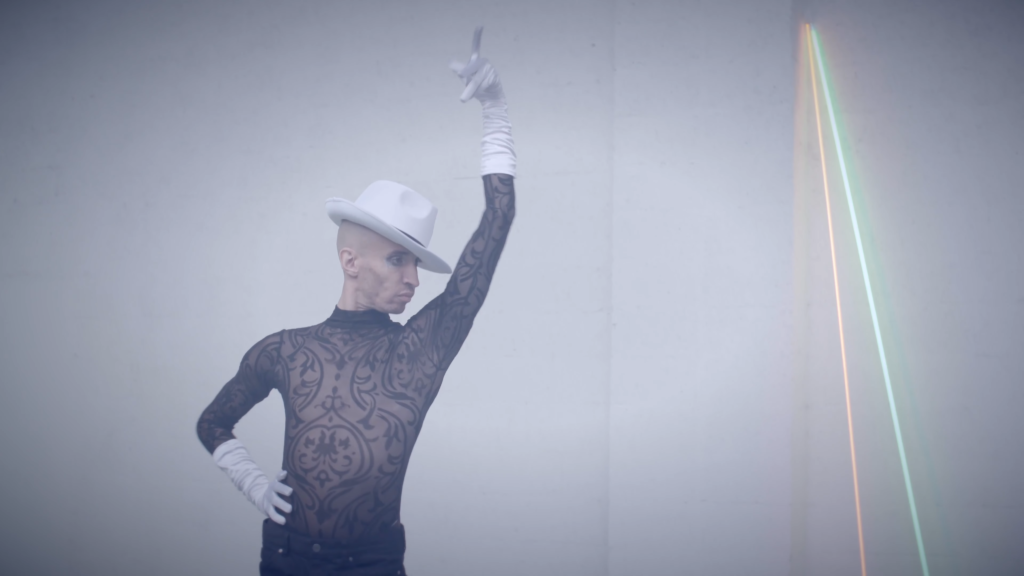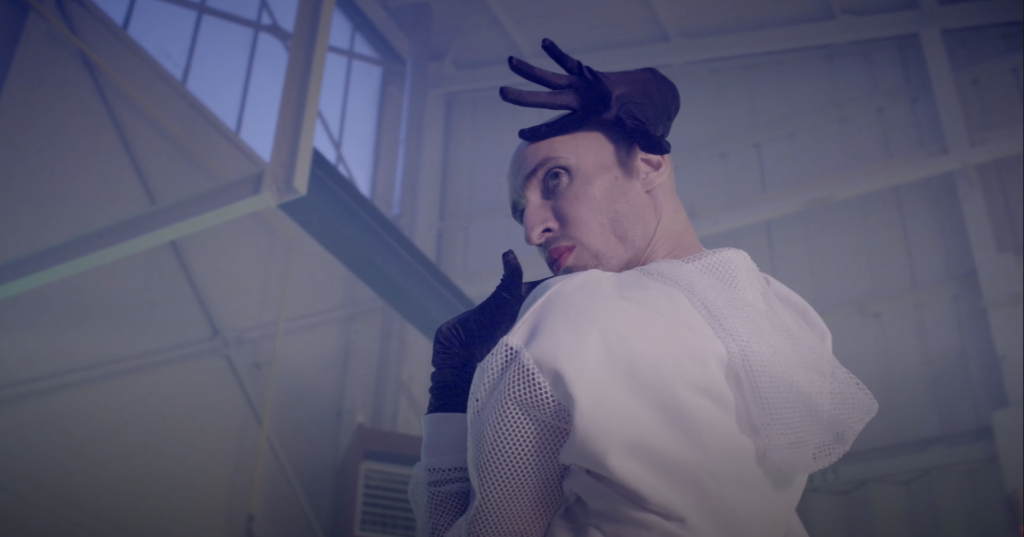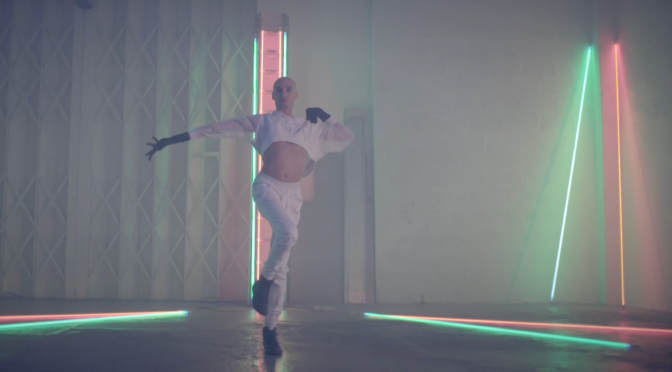Emma recently interviewed Darren Pritchard, vogue choreographer and teacher and mother of the dance troupe House of Ghetto based in Manchester.
Darren is one of the stand-out stars from the recent BBC documentary Deep in Vogue, and features in the music video for our track ‘Chemical Reaction’.
The interview took place over Zoom in early 2021 when the country was under national restrictions. Here’s the edited highlights!

Hi Darren! Tell me, how are you coping with the pandemic?
I’m really good and I’m really fortunate and blessed to have actually gained some work in new fields and new areas, which has kept me busy. I also have weekly meetings with my Houses which kept me really sane over Zoom. So, I’m blessed and I’m fortunate in this time where others in my career and field, and I’m talking about self-employed freelance artists are not.
It’s so nice to hear that, because so many artists are struggling right now. You want people to thrive in these terrible circumstances, so I’m happy. So, tell us, how did you come to be a vogue dancer and choreographer?
OK so, I actually started voguing a good few years ago, and how I started was through my House mother, which was Darren Suarez in Liverpool. I’m very fortunate that I call a second-generation UK voguer. He was an original voguer in the 80s in Liverpool. So what happened is, Paris is Burning came out, which is kind of like the bible for all vogue and he actually had a House in Liverpool called the House of Banjee Realness, which is taken from a category from Paris is Burning. So he had that group in Liverpool, and then vogue kind of went out of vogue. We kind of reconnected when we went to the same training institution but at different times. We had a conversation and at the time the Jason Nevins video It’s Like That came out with all the breakdancers. And I was like, “Darren, we need to do something like that, but with vogue”, because there was a re-emergence of the 70s/80s. It was all from a very cis, straight, male revival. And I was like, we need to bring back that 90s vibe of club culture and what that was about and those spaces that were a lot more revolutionary than those spaces are today.
It just went from there. He taught me, trained me, mentored me, and I project managed the first few vogue balls in Liverpool. He is iconic and pioneering within the UK, the northern ball scene. So I was very fortunate that I had an original person was out when that iconic video dropped. He’s a beautiful voguer as well, and his style is old way. They say there’s no school like the old school, and that the old way is the only way, so I was really fortunate that I learned from him and I was able to pass that down. I always say that Darren’s the seed that made the tree grow.
Would you consider yourself old way?
Yes. My preferred preference if I’m walking a ball, is old way. Just to go a little bit into the style if people are listening to this and going “what is old way?” There’s three fundamental dance styles in vogue, when people are walking a ball. You’ve got old way, which is pre-90s, and with each of the sections there’s always a musical style that goes with it as well, because of the influence of the music and the sonic sound at that time. My old way track that I love is by First Choice.
So, you went through the history of how the revival with Darren Suarez in the North, then you were involved in Deep in Vogue, this BBC documentary. Can you tell us a bit more about how that came about and how the Northern scene has become so prolific?
The way Deep in Vogue came about was – we get lots and lots of requests from people for us to talk about the scene, to film it, to photograph it, but we’re very precious and we’re very wary of who comes into our scene, what those conversations are, and who’s taking pictures of us and filming us, and doing interviews like this. So it was around four years ago, I had a very good friend called John Paul Riley who I’ve known since I was 14. He came to every ball and supported it, and he said that there were two of his friends who wanted to make a documentary about the vogue balls. Dennis, one of the producers and directors of the documentary came along to the ball so he actually understood the culture and where it had come from. Amy had also gone to a couple of them. So John Paul was like, “Darren, Darren, they want to make a documentary, and they’ll be really respectful, and Amy’s an amazing editor and Dennis is just a really good person who’s got a really artistic eye”, and so I opened up the conversations with them. Then I became executive producer on that project, and that was very important to have someone involved.
We had a beautiful working relationship – I really respect Amy and Dennis and the work they did on the documentary. It was all done for free and favours – very Mancunian! But we had access to some of the best stuff, the best equipment, the best studios. It was just that Manchester thing of, “I know somebody who knows somebody, will they do it for a plate of Thai vegan curry?” The music we got donated was by Crazy P and Nihilist, so we just created this documentary that we really wanted to be a love letter to the Northern vogue ball scene, and I think they really achieved that.
It’s doing the rounds in America, and we’ve got a Blu Ray of it now and it’s a brilliant point of reference for when people ask about the Northern ball scene, then I can go “watch Deep in Vogue”.

I watched it and I thought it was incredible. I thought it was beautifully done. It’s nice to see something in the North of England because often things are so London-centric, it’s a beautiful, high-quality scene.
Yeah, and it’s like, it’s just opened up so many doors and I think that’s what captured people’s imaginations – the fact that it’s Manchester and Liverpool. I think what people connected to on that was it didn’t really matter that it was a queer documentary, because I said I wanted to do a show about humanity and humans and show the diversity of the vogue scene and how, no matter what colour, shape, creed, race, political affiliation (although we all are kind of the same there), we can have a scene and a safe space, always honouring where it came from. It was black and queer, disenfranchised kids from New York that set up this scene, but also, it’s moved on and it’s revolutionised and that essence of family and chosen family is alive in all of us. People get it from the North, if you’re from Leeds, if you’re from Sheffield, even up to Newcastle. When I went to Sheffield, people were like “you just get it”. You just get that kind of DIY, fighting culture and I think Ricky says that we know what it’s like to be oppressed in the North, we are at a disadvantage economically to the South just because of the way the political landscape lies.
I just want to ask you why is that culture and community so important to you? What does it represent?
Well, being a kind of queer, mixed-race guy, a working-class guy, from a single mother, brought up in the North, there’s a lot of resonances that I can take from the original voguers. I may not have been made homeless, but I was poor, and I was disenfranchised, and I was brought up in the 80s and 90s. A lot of it is that I get – besides my family that I am extremely close to – I get to have an amazing queer chosen family. There’s something about finding your tribe and finding your people that understand you 360 degrees. Women understand this about code switching. We use this as a racial term, but you know, about acting one way, or dressing another way. We have to downplay our culture, or women have to downplay their sexuality because it’s seen as too much, or as an invitation for unsolicited behaviour or negativity towards you. Without the queer/alt community and without my allies and people who understand me and understand safe spaces, that is so important to me. With the vogue Houses that I’ve built, I’ve been fortunate that I’ve built my tribe, I’ve built a friendship and a network of people that just get who I am and understand where I’m coming from.
Tell us more about your Houses! I’d love to know more about House of Ghetto. What’s so unique about that and what’s so fabulous about that troupe?
House of Ghetto is my baby, whenever people ask me, I say I’m mother of House of Ghetto. That started off originally as a collective of drag queens and the girls and a few gay guys, then it went to the six girls that you see in Deep in Vogue, they’ve gone on to do amazing things. That’s incarnated into a collective of queer guys now. So it’s changed and manifested and grown. Even the people that started it off originally, we’re all still friends. It’s not like I’ve pushed anyone out or people have left, it’s just that thing’s grow and they manifest, and they change.
It’s extremely queer now, it’s all queer, all black and all male at the moment.
If someone wanted to learn more about vogue dancing and culture, more than they’ve learned today and particularly in the Northern scene, where should they start?
Instagram – that’s where most of the Houses platform themselves. Especially in the North, if you’re looking for a House, I’d say look at House of Flava, House of Ghetto, House of Black – that’s the best way to get in touch and see what workshops are going on, or if there’s a ball going to be put on. I’d say watch Deep in Vogue on iPlayer, so you know what it’s all about. And keep a look out for any of those Houses on Instagram more than Facebook.
In-person meeting again, that’d be so amazing, wouldn’t it? And we can go to gigs again and see performances. I’m really hoping that happens soon.
It shut down a few of the balls, so hopefully they’ll get back up this year and hopefully we’ll have another one in Leeds.
So, what’s next for you?
We’ve hopefully got some funding and will be doing our first family vogue ball which is more of a show, which is literally educating some children. We do a lot of vogue balls and people are like “I wish my kids could come but it’s not age-appropriate”, so we’re designing that. It may tour to seven cities if that comes through. Artistically I’m working on a musical called Rent Party and that’s been brought back this year. Planning balls and fundraising, money’s very hard to come by at the moment. And we’re still doing our gigs, so you may see us pop up at Glitterbox. We’ve started a relationship with Glitterbox and Defected Records, we dance with them a lot. Homo Electric we do and looking at some kind of monthly thing with one organisation at the moment, but until that’s confirmed I can’t say much more.
Thank you so much Darren for joining me today, it’s been awesome!
Thank you so much! Bye!

